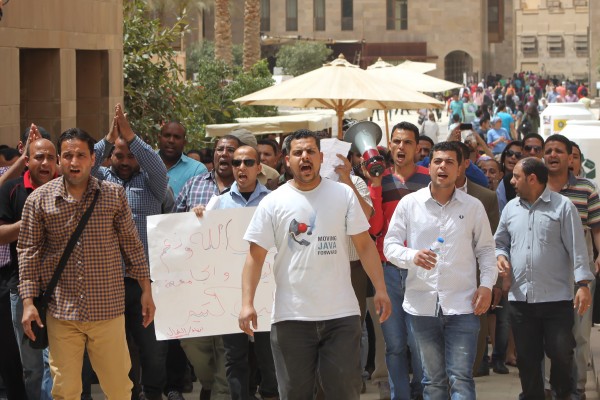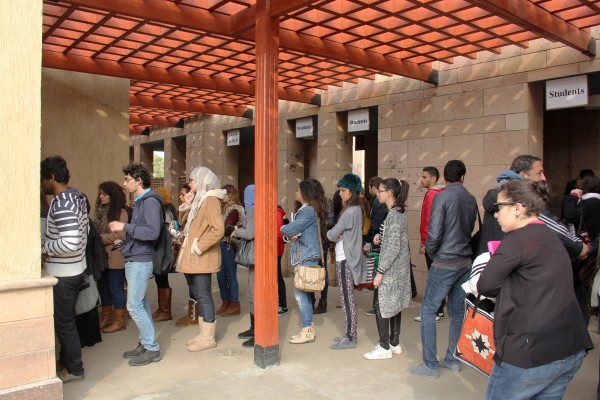Workers: We Won’t Back Down from our Demands
BY MOSTAFA MEDHAT AND MARIAM GEORGE
![Angry staff and workers held a number of protests in previous weeks demanding that administration provide them with better work conditions and wages [AlSheikh]](http://www.auccaravan.com/wp-content/uploads/2015/05/IMG_5356-copy-e1430597226365.jpg)
[AlSheikh]
AUC workers have said that they are likely to continue to protest on campus until their demands for better employment conditions and increased wages are met.The Caravan has learned that workers who went on strike and failed to show up for work on April 19 and 20 have been docked pay.
Sources among the workers have said they are considering their next move, but divisions may have started to emerge.
Nevertheless, there is resentment that they are not being treated fairly.
“All our rights as workers are being infringed upon by the administration,” a housekeeping worker told The Caravan. He preferred to remain anonymous for fear of reprisal.
The workers have three critical demands: They want contracts to be renewed on a three-year basis (currently, contracts are renewed annually); raises and promotions must be expedited; and annual raises should be increased from seven to 10 percent.
Building and Grounds Senior Supervisor Magdy Mohamed Hendawy says he sees no reason a worker’s contract won’t be renewed if he or she is doing their job properly.
The greatest point of contention is the one-year versus three-year contract regimen.
Housekeeping worker Mohamed Bassiouni told The Caravan that if the one-year contract regimen remains in place, it would give too much power to their supervisors.
“A lot of supervisors give the administration bad feedback just because they do not like someone,” he said.
When asked about how workers are assessed, AUC President Lisa Anderson said that she will terminate the supervisor evaluation system.
“Unless there is a note on your file that you have been particularly good or particularly bad, everybody will get the same raise,” she said.
Anderson also said that since she became president in 2011, three- year contracts were reportedly abused as some workers appeared to do little work.
But Anderson stressed that a small number of workers participated in the latest round of strikes in April.
“If there are 1,000 workers [and] 900 of them are not on strike, that makes those on strike a minority,” she said.
But a greater number of workers who may not have participated in the strike nonetheless say they have concerns about new AUC staffing policies.
Bassiouni fears that a new policy to reduce staff by 20 percent could cost him his job.
“After serving this university for the past 25 years they want to let go of me, where am I supposed to go at this age?” said the 47-year- old. Anderson says such worries are misplaced.
“What the workers do not understand is that they are completely excluded from the new staff planning because we are only focused on middle management, everyone with a signature authority,” she said.
Workers have also demanded that raises be increased from an annual seven to 10 percent in tandem with a government June 2014 decree that applies to full- time and temporary employees.
But Human Resources Manager Hatem Hafiz Zaki says that the decree applies only to public institutions, not private institutions; AUC, is therefore obliged to only dispense a seven percent annual raise.
“All the raises and promotions are included in the new budget starting from July 1 and all workers will be informed what they’ll get by the end of May,” he added.




